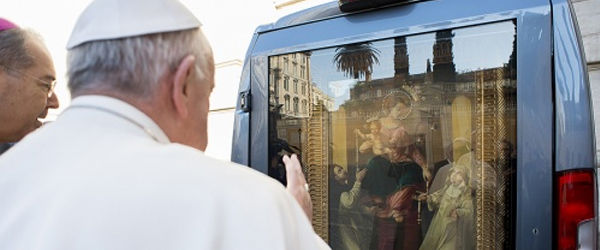Carl A. Anderson, head of the U.S.-based Knights of Columbus and secretary of the Vatican bank's board of supervisors, said a commitment to promoting transparency led the board to fire Ettore Gotti Tedeschi as bank president.The board unanimously passed a vote of "no confidence" in Gotti Tedeschi's leadership May 24 during a meeting in which the Italian banker was allowed to speak "for more than 70 minutes," according to a memorandum released by Anderson.
The board of the bank, formally known as the Institute for the Works of Religion, issued an unusually blunt statement through the Vatican Press Office May 24, noting that members had repeatedly expressed concern to Gotti Tedeschi about the bank's "governance," but that the "situation has deteriorated further."
The board's action was explained further in the memorandum to Gotti Tedeschi, which informed him of the vote after he "abandoned the premises without notice," the memo said.
Signed by Anderson, the memo said the board acted based on the president's "failure to carry out basic duties" of the office; his failure to "remain informed" of the bank's activities and to keep the board informed; abandoning or failing to attend meetings; "exhibiting lack of prudence and accuracy" when talking publicly about the institute; and because of "progressively erratic personal behavior."
In addition, board members said Gotti Tedeschi failed "to provide any formal explanation for the dissemination of documents" last known to have been in his possession.
The board did not mention the so-called "VatiLeaks" scandal in which private letters to Pope Benedict XVI, notes to his personal secretary and encrypted cables sent from Vatican embassies to the Vatican Secretariat of State were leaked to an Italian journalist beginning in January. The day before Gotti Tedeschi was fired, Vatican police arrested the pope's butler after discovering private papers in his Vatican apartment.
In mid-May, dozens of confidential texts, including several notes from Gotti Tedeschi to Msgr. Georg Ganswein, the pope's personal secretary, were published in a book by the journalist who first revealed the papers. The letters from Gotti Tedeschi outline concerns about the impact of the global financial crisis on the church, about discussions with Italian government authorities over the taxation of church properties and about the Italian treasury police's seizure in 2010 of 23 million euros (US$30 million at the time) that the Vatican bank had deposited in an Italian bank.
Gotti Tedeschi was placed under investigation at the time in a money-laundering probe; Italian authorities said the bank failed to disclose information about banking operations as mandated by Italy's 2007 law against money-laundering.
The funds were released in June 2011, following a major reform of the Vatican's banking laws.
A December 2010 Vatican law defined financial crimes and established penalties --- including possible jail sentences --- for their violation. At the same time, Pope Benedict instituted a new agency called the Financial Information Authority to monitor all Vatican financial operations and ensure they reflect the latest European Union regulations and other international norms against money-laundering and the financing of terrorism.
The Vatican currently is working toward gaining a certificate of approval from the Council of Europe's Committee of Experts on the Evaluation of Anti-Money Laundering Measures and the Financing of Terrorism, known as Moneyval.
Speaking to reporters after the board's vote, Anderson said the bank is fully committed to transparency and to bringing all of its procedures into line with international banking norms.
Vatican offices, international religious orders and Catholic institutions use the bank to deposit, spend and transfer money in a variety of currencies around the world.
In the Vatican bank board's statement released by the press office, members said they were "saddened by the events which led to this vote of no confidence, but believe that this action is important in order to maintain the vitality of the institute."
"The board is now looking ahead to the search for a new and distinguished president," who can promote "effective and wider relations between the institute and the financial community based on the shared respect of accepted international banking standards," the statement said.
In brief comments to the Italian news agency ANSA May 24, Gotti Tedeschi said, "I'm torn between a concern to tell the truth and not wanting to disturb the Holy Father."
"My love for the pope is even more important than the defense of my reputation, called into question in a cowardly way," he said.
Pope Benedict had named Gotti Tedeschi, an Italian banker and professor of financial ethics at the Catholic University of the Sacred Heart in Milan, as president of the bank in 2009.
---CNS

